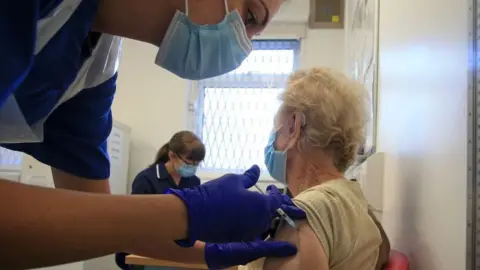Extra Covid booster in spring for over-75s and high risk
 Getty Images
Getty ImagesAn additional booster dose will be offered to all adults over-75 and the most vulnerable over-12s in the UK this spring.
The UK's vaccines advisers said an extra dose would help top up their protection against severe Covid-19.
Many of the oldest received their latest shot back in the autumn and immunity may now be waning, it said.
An autumn booster programme, aimed at a wider group of people, is also planned later this year.
Up until now, only people with severely weakened immune systems had been eligible for a fourth dose - three doses plus a booster.
Those now being offered a second booster this spring, to be administered six months after their previous dose, are:
- adults aged 75 years and over
- residents in a care home for older adults
- individuals aged 12 years and over who are immunosuppressed, or have weakened immune systems
Adults will be offered a Pfizer or Moderna vaccine, while children aged 12-18 will receive Pfizer.
Around 7.2 million people in the UK aged over 75, who have already had their primary course of Covid vaccines, will be eligible for the extra spring booster.
Another half a million people who are immunosuppressed, with diseases such as blood cancer or who've had an organ transplant or are receiving chemotherapy, can also have the additional booster.
The Joint Committee on Vaccination and Immunisation (JCVI) said vaccinating these groups was a "precautionary" move and did not mean there was any current danger to their health.
But because people in these groups are at higher risk from Covid-19, have weaker immune systems than other people and were last vaccinated in September or October 2021, their protection from vaccines might be waning more quickly.
Data suggests that older people who have had two doses of a Covid vaccine have about 45% protection against hospital admission with Omicron, rising to 90% straight after their first booster.
Ten weeks later, that protection has dropped to about 88% but the JCVI believes that even a small drop-off in protection among vulnerable and older people can have a large impact, including on hospital admissions and the NHS.
Winter is seen to be the season which poses the greatest threat from Covid, particularly for older adults, the NHS and care homes.
Top-up jabs
Prof Wei Shen Lim, chair of Covid vaccination at the JCVI, said: "Last year's booster vaccination programme has so far provided excellent protection against severe Covid-19.
"To maintain high levels of protection for the most vulnerable individuals in the population, an extra spring dose of vaccine is advised ahead of an expected autumn booster programme later this year."
Health and Social Care Secretary Sajid Javid said he had accepted the JCVI's advice and asked the NHS to prepare to offer a vaccine to those eligible. He added that further details would be sent out in due course.
"It's important that everyone gets their top-up jabs as soon as they're eligible," he said.
Scotland's Health Secretary Humza Yousaf said a further dose would be offered to high priority groups from next month.
The JCVI said data showed that the risk of being admitted to hospital after being infected with Covid-19 was highest in the over-75s, but some scientists questioned why over-65s, a much larger group, were not included.
"With community infection rate still stubbornly high, there is ample opportunity yet for another variant with higher case fatality rate to emerge before the proposed autumn campaign - and if it does perhaps this advice may yet be regretted, given that it's a long time to wait for autumn," said Prof Penny Ward, visiting professor in pharmaceutical medicine at King's College London.
However, Prof Jonathan Ball, professor of molecular virology at the University of Nottingham, said the boosters plan was "a sensible thing to do".
"We know that immunity contracts over time and that this is usually more pronounced in older people, who are also most likely to develop serious disease. Therefore, giving these people an additional boost to their immunity makes sense to help protect them disease."
